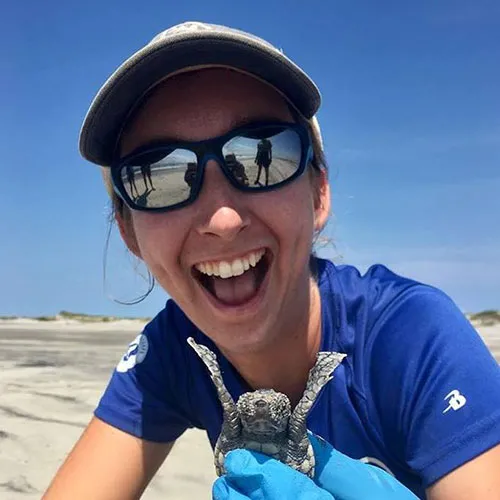Abigail Burke
Environmental Studies

My Salve education provided me with a well-rounded knowledge base, which I am able to apply both to real-world field situations as well as my numerous interactions with visitors from all walks of life.
Conservation biology, a cornerstone of Salve Regina’s environmental studies program, challenges students to explore practical approaches to protecting and restoring sensitive biological communities.
Throughout her time at Salve Regina, Abigail Burke ’19 – a double major in environmental studies and cultural and historic preservation – took that charge to heart, taking advantage of multiple opportunities to work with threatened species at national seashores along the East Coast.
During a 2017 internship, Burke worked with nesting sea turtles at Cape Lookout National Seashore in North Carolina. For the past two summers, she’s been a park ranger at the Cape Cod National Seashore, where her charge is to protect and monitor piping plovers and other endangered shorebirds on the cape’s outer beaches.
From mid-August through November, Burke will intern with Yellowstone National Park’s fisheries department, working to remove invasive trout from Yellowstone Lake and restore the native Yellowstone trout population. She will also participate in a variety of graduate projects that aim to restore amphibian populations.
After that internship is complete, Burke hopes to continue working in conservation biology at Yellowstone. “Either way, I plan to explore seasonal jobs and internships over the next few years to identify which area of biology and history I really want a career in, and eventually go to graduate school to further this study,” she said. “This will also give me the opportunity to boost my resume, build professional connections, travel and learn about different cultures.”
Burke hopes that her efforts to protect and preserve wildlife will have a lasting impact on the environment. “It’s disheartening to learn of environmental degradation around the world and the millions of species that have to cope with it as a result,” she said. “I'd like to think my internships have helped play a small role in bringing some good to our environment.”
In addition to internships, the environmental studies program provided numerous opportunities for hands-on learning, including local bird banding projects and field studies in New Hampshire, Massachusetts, Block Island and Narragansett Bay. “I soaked up every volunteer opportunity in the field that I could get my hands on,” Burke said. “As much as I enjoyed the classroom studies, it was these opportunities that convinced me to begin my career traveling around doing fieldwork.”
Focusing on both cultural and historic preservation and environmental studies opened up a wide range of career opportunities for Burke, who is now equipped for positions that require a science degree along with those based in the humanities. “This gives me a great deal of flexibility when choosing a career path,” she said.